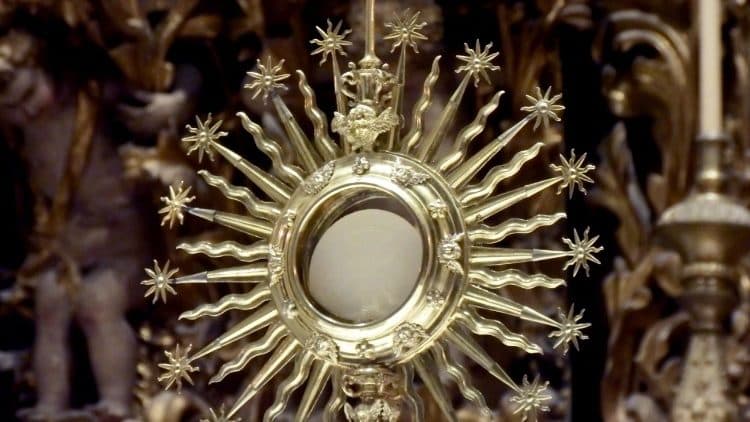At times, the Catechism of the Catholic Church can read like a plumber’s manual. While such an approach might be needed in some areas, such as within the intricacies of the various parts of the creed, it’s not as required in the realm of the spiritual life. And so, while the fourth part of the Catechism has an important internal structure, it certainly breaks from any resemblance of a manualistic approach to prayer.
The first chapter of the first section concludes its third and final article by directing the minds and hearts of believers to the sacred liturgy. After covering the different forms of prayer – from blessing and adoration, petition, intercession, thanksgiving, and praise – the Church’s universal teachings on the spiritual life point us to the font and source of it all.
The Church culminates her teachings on prayer by deferring and shifting everything to the Eucharistic Sacrifice. Adhering to the Lord Jesus’ command, “Do this in remembrance of me,” the Church offers the Eucharistic Sacrifice daily and sees all forms of prayer as fulfilled and flowing from it.
The Catechism teaches: “The Eucharist contains and expresses all forms of prayer.”
As the Holy Spirit makes present the one historical sacrifice of the Lord Jesus, offered over two thousand years ago at Calvary, within the mystery and mysticism of the Eucharistic Sacrifice, so the Holy Spirit manifests, celebrates, and brings to completion all the forms of prayer that are found within the human heart.
The Eucharist is the blessing and adoration of God by the Lord Jesus. It is the height of petition and intercession as the Lord offers himself to the Father for our salvation. The Eucharist is the Lord Jesus’ thanksgiving to the Father for giving him the call to redeem and bring humanity back to him. On this point, the word “eucharist” literally means “thanksgiving.” And the Eucharist is the praise of God the Son to God the Father by the power of God the Holy Spirit.
The Eucharistic Sacrifice is the ultimate, heartfelt, and unparalleled praise offered to the Father. It is the untouched – but very approachable – perfect praise of God.
In the Eucharistic Sacrifice, all forms of prayer find their fulfillment and fruition. The Eucharist is the heart of prayer. Prayer cannot reach its peak without the Eucharist. Without question, the Eucharist is the summit and source of our prayer and spiritual lives.
The Eucharist is not simply the height of our own personal prayer. It is the culmination and completion of all the prayers of the entire body of believers. The Eucharist finalizes my prayer as a believer, but also our prayer as a Church.
The Catechism explains: “[The Eucharist] is ‘the pure offering’ of the whole Body of Christ to the glory of God’s name and, according to the traditions of East and West, it is the ‘sacrifice of praise.’”
The Eucharistic Sacrifice teaches us that we never pray alone. No believer ever offers up prayer by themselves. We are always within the body. We are always united with one another. The Eucharist is the perfect expression of this unity and reminds us of our bond to one another in Jesus Christ.
Even when the Church’s hermits and cloistered Religious pray, they pray within the body and for the body of believers. They are more united to us than we can realize in this life.
As Christians, we relish and rally within this bond of peace with one another in the Lord Jesus. The Lord brings us together, as Saint Paul teaches us: “One Lord, one faith, one baptism,” and “one body, one Spirit.” We come before God in prayer as a people and never as individuals alone by ourselves.
As one body, with one voice – expressed in countless different ways – we offer up our praise to God most perfectly and preeminently in the Eucharistic Sacrifice. It’s where our prayer always turns and where our prayer is always nourished.
With this emphasis on the Eucharistic Sacrifice, the first section of part four of the Catechism concludes its first chapter on prayer. It then moves to its second chapter, which is marked by an exploration into the tradition of prayer.
For more spiritual resources, visit Father Kirby’s YouTube channel, Daily Discipleship with Father Kirby.













